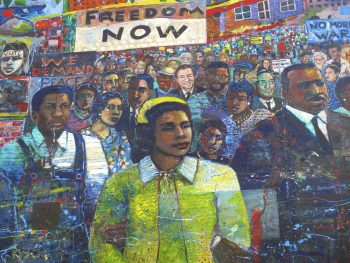
“I have decided to stick with love…Hate is too great a burden to bear.” ~ Dr. Martin Luther King, Jr.
Every year I have the honor of teaching diverse 6th grade classes about Dr. Martin Luther King, Jr. Alongside my colleague, Marion, who marched with King and vividly remembers the burden of hate, we show children that they can be the dream King envisioned. They create photo essays of their beloved communities, showcased in our college’s art gallery. I see King’s legacy through children’s eyes. But one element of activism adopted by King’s widow and son is lesser known: their veganism.
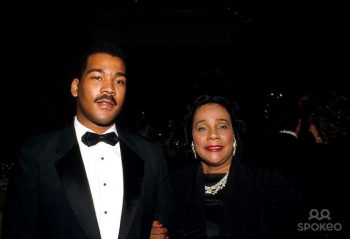
Dexter Scott King, just seven years old when his father was murdered, became vegan from the example of the late comedian and human rights activist, Dick Gregory. Dexter King’s reason? “If you’re violent to yourself by putting things into your body that violate its spirit, it will be difficult not to perpetuate that onto someone else” . This echoes his father: “The ultimate weakness of violence is that it is a descending spiral, begetting the very thing it seeks to destroy.” Dexter persuaded his mother, Coretta, to go vegan in 1995. She said veganism was “the next logical extension of Martin Luther King, Jr.’s, philosophy of non-violence” .
For those against linking animal and human rights, consider the words of Nobel Peace Prize winner Desmond Tutu: “I have spent my life fighting discrimination and injustice, whether the victims are blacks, women, or gays and lesbians. No human being should be the target of prejudice or the object of vilification or be denied basic rights. But there are other issues of justice—not only for human beings but for the world’s other sentient creatures. The matter of abuse and cruelty we inflict on other animals has to fight for our attention in what seems an already overfull moral agenda. I have seen firsthand how injustice gets overlooked when victims are powerless and vulnerable, when they have no one to speak up for them and no means of representing themselves to a higher authority. Animals are in precisely that position. Unless we are mindful of their interests and speak loudly on their behalf, abuse and cruelty go unchallenged” (Global Guide to Animal Protection).
King combated cruelty through three forms of love: eros (romantic), philia (friendship), and agape. “Agape is understanding, creative, redemptive good will toward all, an overflowing love which seeks nothing in return. When you love on this level, you love all men, not because you like them, not because their ways appeal to you, but because God loves them. This is what Jesus meant when he said, ‘Love your enemies.’ I’m happy he didn’t say, ‘Like your enemies,’ because there are people I find it pretty difficult to like. I can’t like anybody who would bomb my home. I can’t like anybody who would exploit me. I can’t like anybody who would trample over me with injustices. I can’t like anybody who threatens to kill me. But love is greater than liking” (A Testament of Hope).
Embracing agape to alleviate suffering, we must look within. Was it fair that Dr. King had to entreat mercy from oppressors? No. But it was a way out of injustice. Animals’ rights aren’t valued, just as their bodies, families, environments, safety, and lives aren’t valued. We must change this.
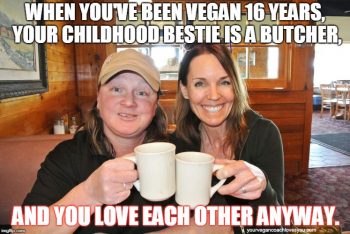 I’ve been vegan 16 years. My childhood bestie’s a butcher—in common parlance—a meat cutter. Do you know who validates my research on the plight of factory farmed animals and workers that “process” them? Steph. She sees firsthand the results. Does she want to be a butcher? No. She got her first job in a grocery store’s meat department when her anxiety made her wary of the public. Her lifelong arthritis makes working in a freezer excruciating. But, she says, “It pays the bills.” And, she says, “I can’t hardly eat meat anymore.” She rescues cats; I rescue dogs. We could be enemies; we remain friends. Is every individual in the system of animal oppression a person I could love? No. Dr. King found the strength to love. How can we? Projecting hate fuels the unconscious madness that has made humans violent in the first place. Seek common ground with opposers. Most of us were not always vegan. The unconditional love we received from animals got many of us here—let’s pay it forward.
I’ve been vegan 16 years. My childhood bestie’s a butcher—in common parlance—a meat cutter. Do you know who validates my research on the plight of factory farmed animals and workers that “process” them? Steph. She sees firsthand the results. Does she want to be a butcher? No. She got her first job in a grocery store’s meat department when her anxiety made her wary of the public. Her lifelong arthritis makes working in a freezer excruciating. But, she says, “It pays the bills.” And, she says, “I can’t hardly eat meat anymore.” She rescues cats; I rescue dogs. We could be enemies; we remain friends. Is every individual in the system of animal oppression a person I could love? No. Dr. King found the strength to love. How can we? Projecting hate fuels the unconscious madness that has made humans violent in the first place. Seek common ground with opposers. Most of us were not always vegan. The unconditional love we received from animals got many of us here—let’s pay it forward.
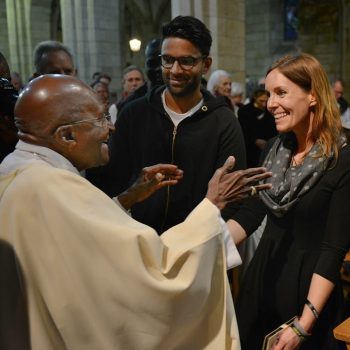
Photo Credit: Eric Miller
Elisa Stone is:
• An Main Street Vegan Academy-certified Master Vegan Lifestyle Coach and Educator
• Certified in Plant-Based Nutrition with Cornell University
• A tenured college professor
• A non-judgmental vegan activist who grew up in rural America and has been vegan 16 years, vegetarian 10 years prior.
Web site: www.yourvegancoachlovesyou.com
Instagram: @livalohagirl
Email: [email protected]

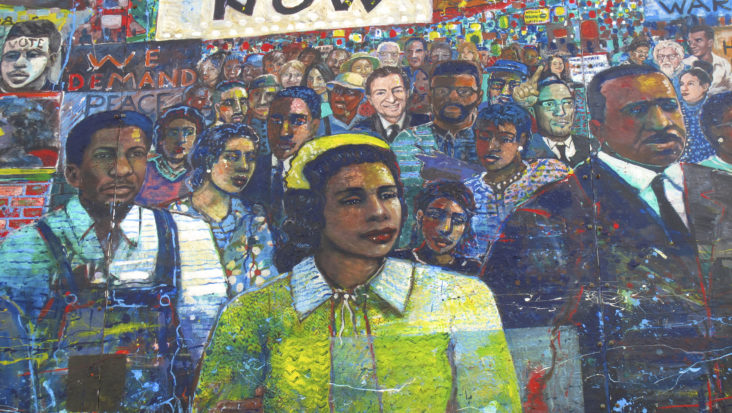
I LOVE this and teach my students about these connections regularly! Thank you for another awesome post.
Thank you so much, Ron! #solidarity ????
Thank you, Elisa, for this eye-opening and educational post. I enjoyed reading it!